Out of Sight

In the maze you rely only on sounds and trust in your fellow team mate in order to navigate
Out of Sight is a multi-player game that is both digital and physical. Through having to navigate a maze blindly and give directions using insufficient means, we want to speculate:
How do we bring people together in new ways after the lockdowns?
Player 1 is blindfolded and has to navigate a maze by stepping on the navigational plates to change directions. Player 2 is mute and has to make sounds to signal which way the other player must go. The players will have to come up with a common understanding of the sounds in order to develop a language for communicating - only then can they complete the game. This forces the two players to work together in new ways without using spoken works to communicate. This is also a challenge since they aren't allowed to decide on which sound means what before the game starts.
How to play at home
Our game was designed to be played physically at our game exhibition, however you can still play it at home with slight alterations. You will need a teammate. Player 1 will be blindfolded and press the arrow keys - if you have an external keyboard, feel free to use that. Player 2 will guide player 1 using sounds. Here you can choose any sound making objects or clapping/stomping. The map of the maze can be seen here on this site. Sadly the sound of collecting a coin as well as the coins collected counting function was lost when we uploaded the game here, and we have not yet been able to fix that. Player 2 is therefore encouraged to yell “WUHUU a COIN!” and thus provide feedback for player 1 when coins are collected. You can have a go at beating the highest score (see the scoreboard picture) from the exhibition day by timing yourself from the first sound is made to you reach the finish line and subtracting five seconds for each coin collected along the way.
Our process
We took our inspiration from the idea of creating a game where you either play with or without your eyes. In this way you experience using your senses in a way that might be unfamiliar.
We were also inspired by classic arcade games and our game takes inspiration from games like Pac-Man and Dance Dance Revolution.
We started with creating a physical maze-prototype out of post it notes, and made it digital using Unity and Makey Makey.
Can I cooperate with someone, I don't know?
Experience how mutual understanding will occur between you, as you work together to complete the maze.
Based on communication research (Clark & Wilkes-Gibbs, 1986), where two strangers had to communicate the order of various arbitrary shapes to each other using only words, it was found that their communication became more time-efficient as their mutual understanding of the shapes developed. In this game we ask you to cooperate in developing a mutual understanding of the meaning of various sounds - you will discover that this becomes easier as you continue your journey through the maze.

Why this game in a post-pandemic world?
A stranger can be a friend: Shaping a future of togetherness and understanding
During the pandemic we experienced lockdowns and social distancing, and we had to decrease the size of our social bubble because of the limits for social gatherings in order to limit the spread of the virus. The restrictions came with side-effects such as decreased psychological well-being (Rodríguez-Fernández et al., 2021). However, many people have found new innovative ways to fulfill their human needs for social and emotional connection by using technology to communicate when apart (Levy, 2020). We encourage our players to team up with someone they do not know (yet) to experience connectedness and shape a mutual understanding with each other in the physical/digital individual/joint space of our game. This is to make our players speculate about what meaningful togetherness could be in the future - and with whom.
Playtesting
We tested the game at the early stages and at the end of our game development. Through these tests we found that our game forces the players to think in new, unconventional ways. We also discovered that it was important to get feedback from the maze from the blindfolded players point of view.
One player described the game as "Fun and trippy" and another was "surprised the mutual understanding of sounds occured so fast"
Scroll up to enter the maze

Credits
We are the Steakholders. The game was made during the summer course Game.Play.Design at Aarhus University 2021. The theme was speculative games in 'the new new normal. The team consists of 5 members:
Cecilie Langkjær Knudsen - Digital Design
Mads Søndergaard Kolind - Information Science
Matilde Just Sterup - Cognitive Science
Mette Elida Dejnbjerg Jensen - Information Science
Theresa Rømer Andersen - Information Science
References
Bartle, R. (1996). Hearts, Clubs, Diamonds, Spades: Players Who Suit MUDs. https://mud.co.uk/richard/hcds.htm
Clark, H. H., & Wilkes-Gibbs, D. (1986). Referring as a collaborative process. Cognition, 22(1), 1–39. https://doi.org/10.1016/0010-0277(86)90010-7
Huizinga, J. (1955). Nature and Significance of Play as a Cultural Phenomenon. Huizinga, J.: Homo Ludens – A Study of the Play-Element in Culture, Boston (Beacon Press) 1955, Pp. 1-27. https://opus4.kobv.de/opus4-Fromm/frontdoor/index/index/docId/12448
LeBlanc, M. (2005). Tools for Creating Dramatic Game Dynamics [Original essay].
Levy, A. (2020, maj 15). Coronavirus: How times of crisis reveal our emotional connection with strangers. The Conversation. http://theconversation.com/coronavirus-how-times-of-crisis-reveal-our-emotional-...
Rodríguez-Fernández, P., González-Santos, J., Santamaría-Peláez, M., Soto-Cámara, R., Sánchez-González, E., & González-Bernal, J. J. (2021). Psychological Effects of Home Confinement and Social Distancing Derived from COVID-19 in the General Population—A Systematic Review. International Journal of Environmental Research and Public Health, 18(12), 6528. https://doi.org/10.3390/ijerph18126528
Suits, B. (1990). Construction of a Definition. I Grasshopper: Games, Life and Utopia. David R. Godine.
| Status | Released |
| Platforms | HTML5 |
| Author | Steakholders |
| Made with | Unity |
| Tags | collaboration, empathy, First-Person, fun, maze, Multiplayer, Neon, speculative, teamwork |

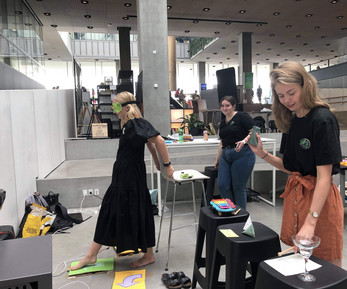
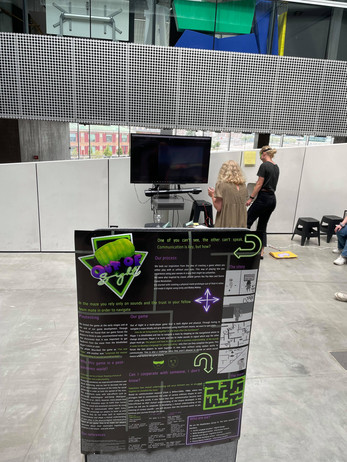
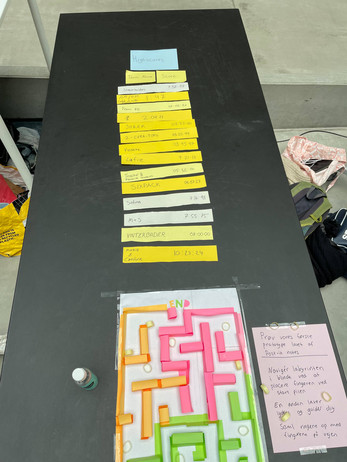
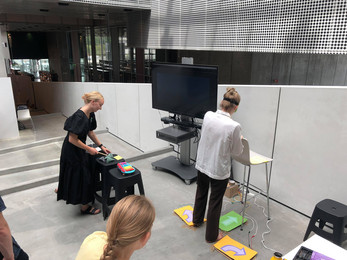
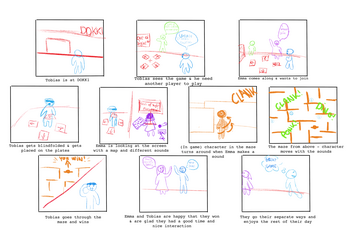
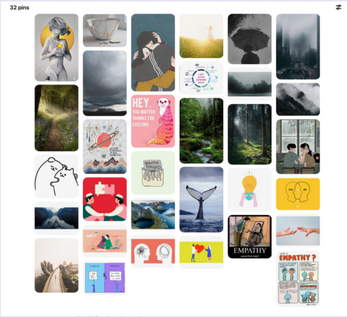

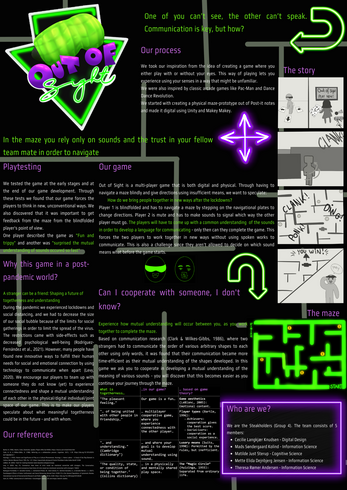
Leave a comment
Log in with itch.io to leave a comment.